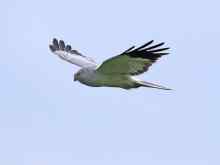Like the canary in the coalmine, Freshwater Pearl Mussels are an indicator of the health of Ireland’s rivers. With a lifespan of up to 120 years, the mussels were once widespread, but are now found in very few catchments. Ireland is estimated to hold around 46% of Europe’s Freshwater Pearl Mussel population, with the Munster Blackwater catchment said to have a large part of the national population.
The 2015 National Survey of Hen Harriers (the fourth national survey since 1998-2000) has shown that the Irish population has experienced further declines, including within some former strongholds for the species. The 2015 survey showed there are between 108 and 157 breeding pairs across Ireland, down by 8.7% since the last survey in 2010. However, increased survey effort complicates comparisons, and if only those squares surveyed in all years are taken into account a bleaker picture is painted.
Recent announcements to the media regarding Agri-environment schemes for farmers are to be welcomed. A major source of frustration for farming communities in upland areas has been the State's conservation strategies aimed at the conservation of Hen harrier. Whilst there has been a drive to develop the uplands in many areas for wind energy and previously for industrial scale commercial forestry, many upland farmers feel that they have been unfairly treated.
Urgent action is required to remove and prevent the spread of invasive plant species like Japanese Knotweed and Himalayan Balsam before it is too late. These species are spreading rampantly along roadsides and riverbanks of both Cork City and County, damaging the built and natural environment.
Yes we are asking the public for their help to let no plant go to seed! We are now into our fourth year of this project and we have made dramatic reductions in the extent of Himalayan balsam infestations along the River Allow and Dalua. With the assistance of participants on the Rural Social Scheme, IRD Duhallow staff and volunteers and the local Kanturk Trout Angling Club, the plant has been dramatically reduced in numbers and distribution. In total we have treated over 24km of linear river bank and drain.
Glorious sunshine greeted the end of school term this year for the many students attending national schools in Duhallow. And how fitting the weather was for one of the more fun elements of the LIFE project. Each year during the months of May and June, field excursions are organised to bring the school children closer to nature. For the many students who took part in these field excursions it presents an opportunity to see firsthand, the diversity of aquatic life still present in our rivers.
Recently IRD Duhallow were invited to present at an international meeting on biodiversity and LEADER and showcase work carried out to help biodiversity in Duhallow. We were delighted to be able to facilitate and provide examples where the LIFE project has contributed at a practical level to the furthering of biodiversity in Duhallow but working closely with our colleagues in IRD Duhallow.



